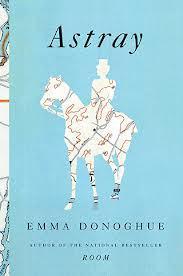 I had a hard time getting into this book at first, but once I did I absolutely loved it.
I had a hard time getting into this book at first, but once I did I absolutely loved it.
Astray is a collection of short stories that are all based in historical fact. Donoghue says in the afterword that she collects interesting facts and anecdotes when she’s doing historical research, so she turned these into stories. As suggested by the title, each character is on a physical or emotional journey of some kind and many of them are departing from societal norms or expectations. The stories are thematically grouped as departures, in transit, arrivals and aftermaths.
Many of the stories are very sad, heartbreaking even, but they are also about hope and growth. Donoghue herself has emigrated (from Ireland to England and Canada) and knows what it’s like to land in a new world, which is what many of her characters experience.
Why am I landing here, out of all possible spots on the turning globe? Why is this home? It’s in my stomach that I register the protest, as the plane dips to the runway: what unfamiliar fields are these? I’ve gone astray, stepped off some invisible track that I was born to follow. How did I get here?
This is a short read that is much more fascinating because the characters are all real people. After each story you get an explanation from Donoghue of the source of the story. In many she used actual letters and accounts. For example, “The Gift” is a gut-wrenching story about a mother who gives her child into protective custody for financial reasons, but doesn’t understand that her child has actually been permanently adopted.
There was not a story in the collection I disliked, but here are a few of my favorites:
- “Onward”: In 1854 London, a woman supporting her family through prostitution hopes for a better life.
- “Counting the Days”: on a ship from Ireland to Quebec in 1849, a woman communicates through letters with the husband she will soon be reunited with.
- “The Long Way Home”: In Wild West Arizona, 1873, cowboy Mollie Monroe drags a wayward prospector back to his wife.
- “The Hunt”: A young German mercenary in the Revolutionary War forms a connection with a girl — only he’s under orders to rape all the women they encounter.
- “What Remains”: In 1960’s Ontario, a woman sculptor reminisces about her life – and art — with her partner Queenie, as Queenie slips into dementia.
As someone who loves to travel, and who constantly thinks about what it would be like to live elsewhere, this book really grabbed me. I may not be a boundary-stretcher myself but I admire those who are.
Travelers know all the confusion of the human condition in concentrated form. Migration is mortality by another name, the itch we can’t scratch. Perhaps because moving far away to some arbitrary spot simply highlights the arbitrariness of getting born into this particular body in the first place: this contingent selfhood, this sole life.
Haunting is a good way to describe most of the stories in this collection. This book is nothing like Room, but just as with Room, I found myself in awe of this writer and what she’s able to convey in a short space. I will certainly read everything else that Donoghue has written.

